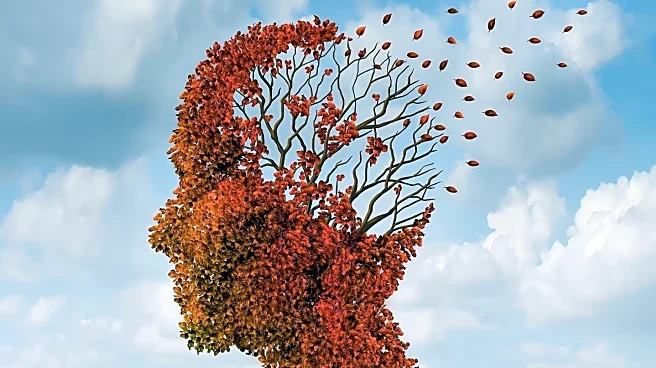What's Happening?
A comprehensive study conducted by the University of Oslo has revealed that the human brain shrinks with age at different rates for men and women. The research, which analyzed over 12,000 brain scans from 4,726 cognitively healthy individuals aged 17
to 95, found that men experience faster and more widespread brain volume loss than women. Despite this, women are diagnosed with Alzheimer's disease at twice the rate of men. The study, published in the journals PNAS and Nature, highlights that while men show a decline in a greater number of brain regions, women exhibit a slower and milder process of brain degeneration. The findings suggest real sex differences in the biology of aging, though the results should be interpreted with caution as the observed volume loss was mild and not necessarily tied to a decline in function.
Why It's Important?
The study's findings are significant as they challenge existing assumptions about the relationship between brain volume loss and cognitive decline, particularly in the context of Alzheimer's disease. Understanding the gender differences in brain aging could lead to more targeted and effective treatments for neurodegenerative diseases. The research also underscores the need for more gender-inclusive studies in neuroscience, as the current scientific bias places a disproportionate burden on female health. By highlighting these differences, the study could influence future research directions and healthcare policies, potentially leading to improved outcomes for both men and women.
What's Next?
The study calls for long-term research to explore whether the observed differences in brain volume loss affect cognition, memory, or the development of age-related neurological diseases. Researchers emphasize the need to disentangle the impact of sex on the brain from other genetic, environmental, and social factors. This could lead to a better understanding of the mechanisms behind Alzheimer's disease and other forms of dementia, ultimately informing prevention and treatment strategies. The findings may also prompt a reevaluation of current diagnostic criteria and therapeutic approaches, ensuring they are more inclusive of gender differences.
Beyond the Headlines
The research highlights the ethical and scientific implications of gender bias in medical research. The lack of large-scale longitudinal studies that consider sex differences in brain aging has left many questions unanswered, potentially affecting the wellbeing of millions. Addressing this gap could lead to more equitable healthcare outcomes and a deeper understanding of how biological and social factors intersect in the aging process. The study also raises cultural questions about how society perceives aging and cognitive decline, particularly in women, and the importance of challenging stereotypes that may influence research and treatment.















